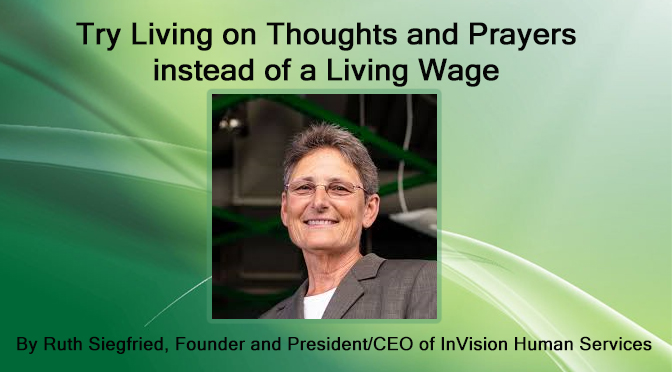|
|
By Ruth Siegfried, Founder and President/CEO of InVision Human Services, based in Harrisburg, Wexford and Reading, PA.
In the midst of the COVID-19 pandemic, Pennsylvania’s leaders have had to confront some brutal truths, including our state’s undeniable dependence on the low-paid health care workers, direct support professionals and other front-line warriors who protect our most vulnerable residents.
For the past 50 plus years, the state has contracted with private providers to run community-based systems that allow people with intellectual disabilities and autism to live in community settings and regular neighborhoods. PA turned to these community providers after having become too dependent on costly institutions, which also had an abysmal history of abuse and neglect in preceding decades.
Community settings were able to bring people with disabilities out of isolation and into the mainstream. Sadly, the system the state created with optimism and hope has turned into a fragile industry built on the backs of low-paid workers. The system’s flaws are more apparent now than ever, as we battle the pandemic.
Direct support professionals don’t have the opportunity to work from home. They don’t have the opportunity to practice social distancing. As essential and health care workers, they spend hours in a hands-on care setting, sometimes remaining 16 hours at a time. Why? Because there is nobody to relieve them: poverty-level wages have made it impossible to attract workers to the field.
The governor and the legislature can change this.
Thirty years ago, when community programs began, the rates set by the state were sufficient to support a family, allowing community providers to attract well-trained professionals. Over the years, governors and legislators on both sides of the aisle took these programs for granted, failing to make sure they were adequately funded to keep pace with changing times.
Salaries in the field dropped to poverty rates, and as the number of direct support professionals applicants dwindled, the list of consumers waiting for services ballooned to more than 13,000 people – including more than 5,000 in emergency status.
It’s hardly surprising that turnover rates in the field today exceed 35%.
During this crisis, it’s been affirming to hear Governor Tom Wolf, Department of Health Rachel Levine and Department of Human Services Secretary Teresa Miller refer to workers in our field as “heroes” for risking their lives to support people with disabilities in need. Members of the General Assembly have sent messages of gratitude, but our direct support workers need more: They need to be able to pay their rent and feed their families.
While elected officials hold us in their thoughts and prayers, revision to the state payment formula is essential: These life-sustaining workers need a living wage and they need it now, before there is no one left to care for those who need it most.
Information provided to TVL by:
Gary H. Blumenthal
Vice President, Governmental Relations and Advocacy
InVision Human Services
Innovative Approach. Shared Vision.
www.invisionhs.org








